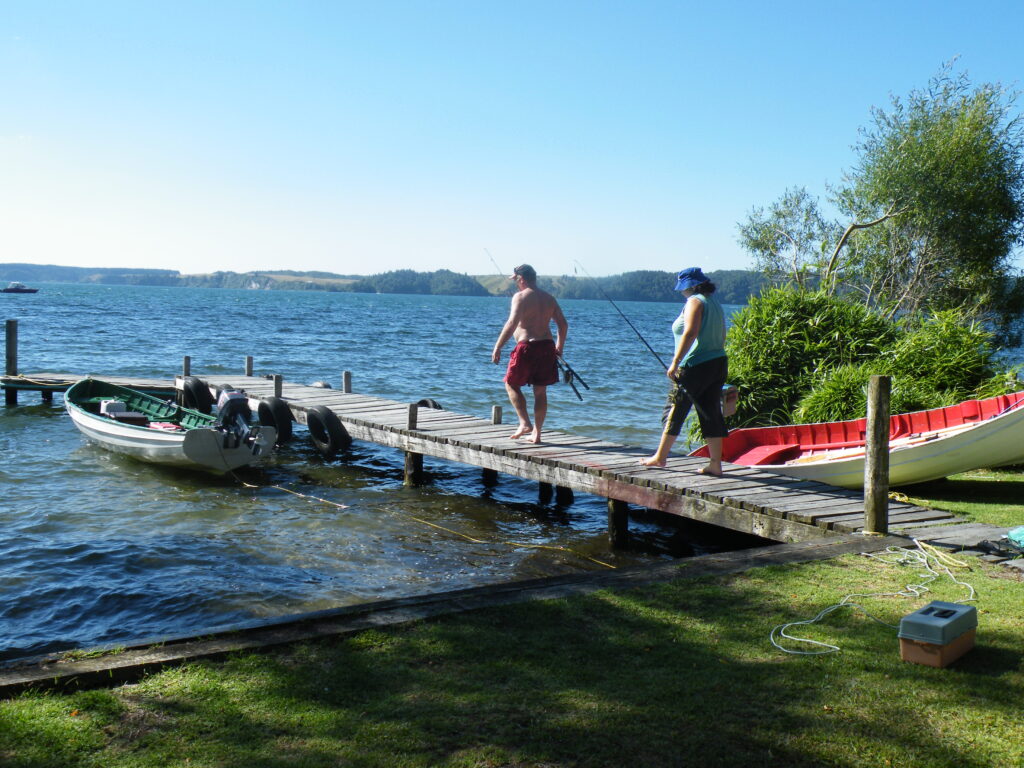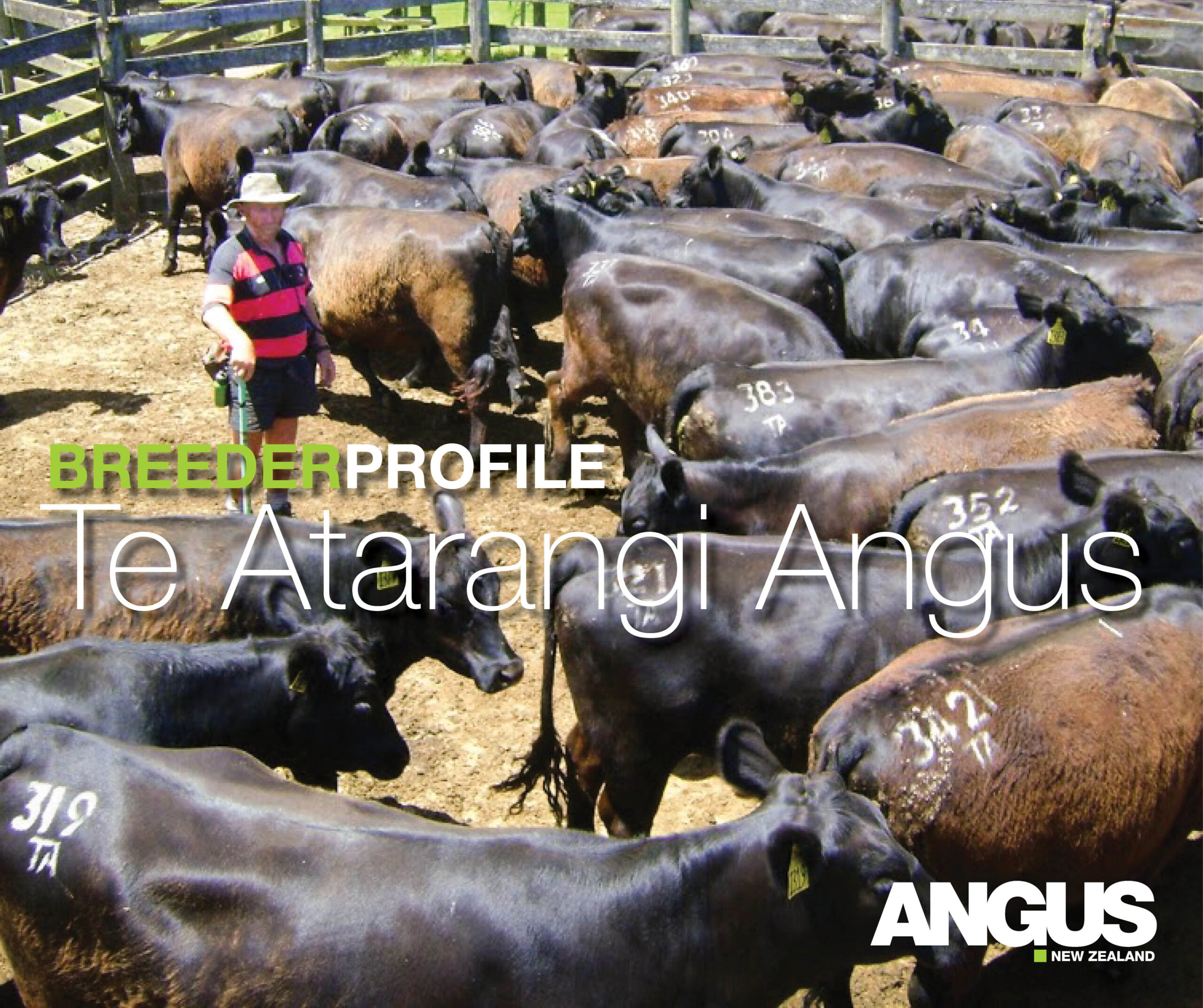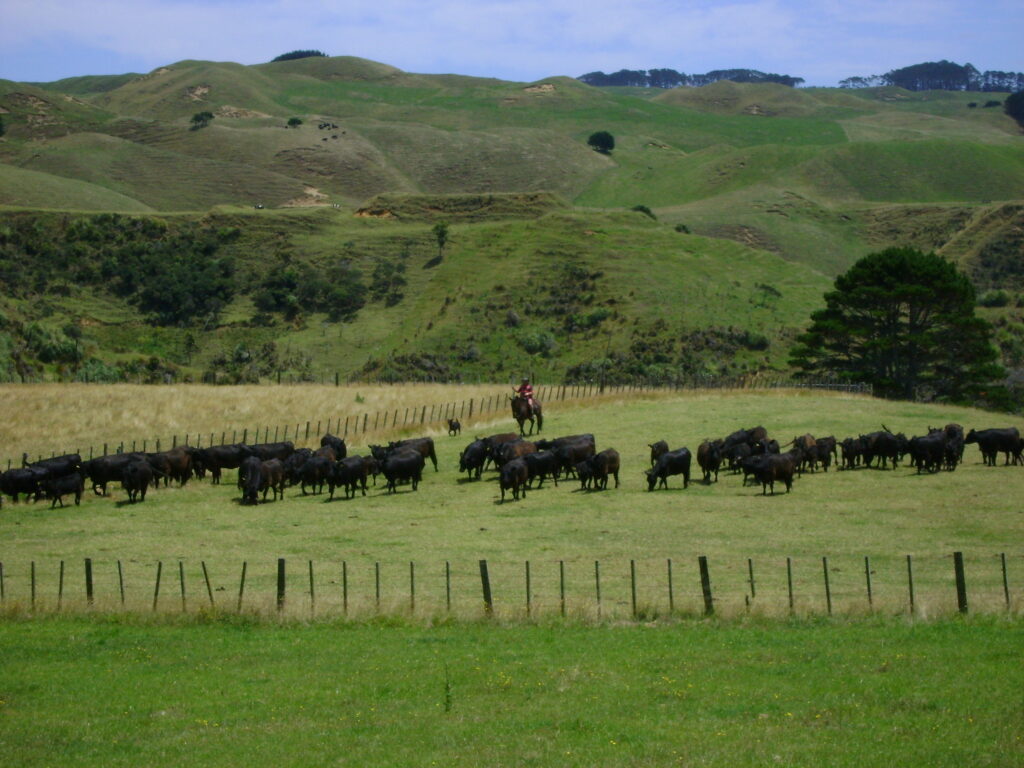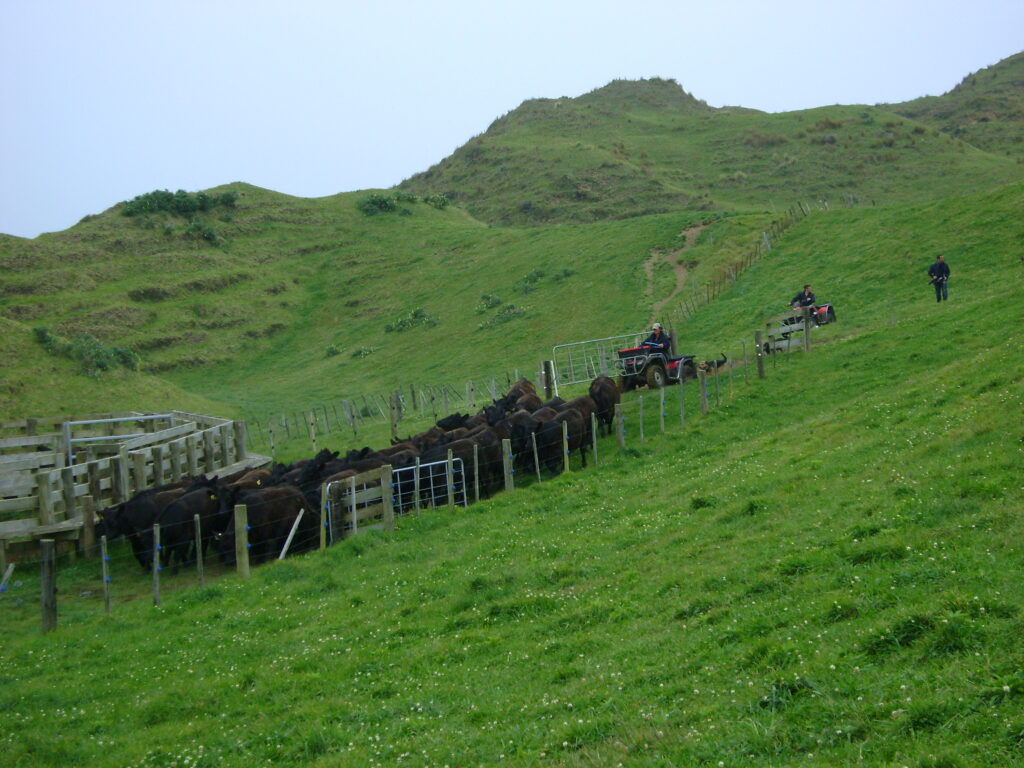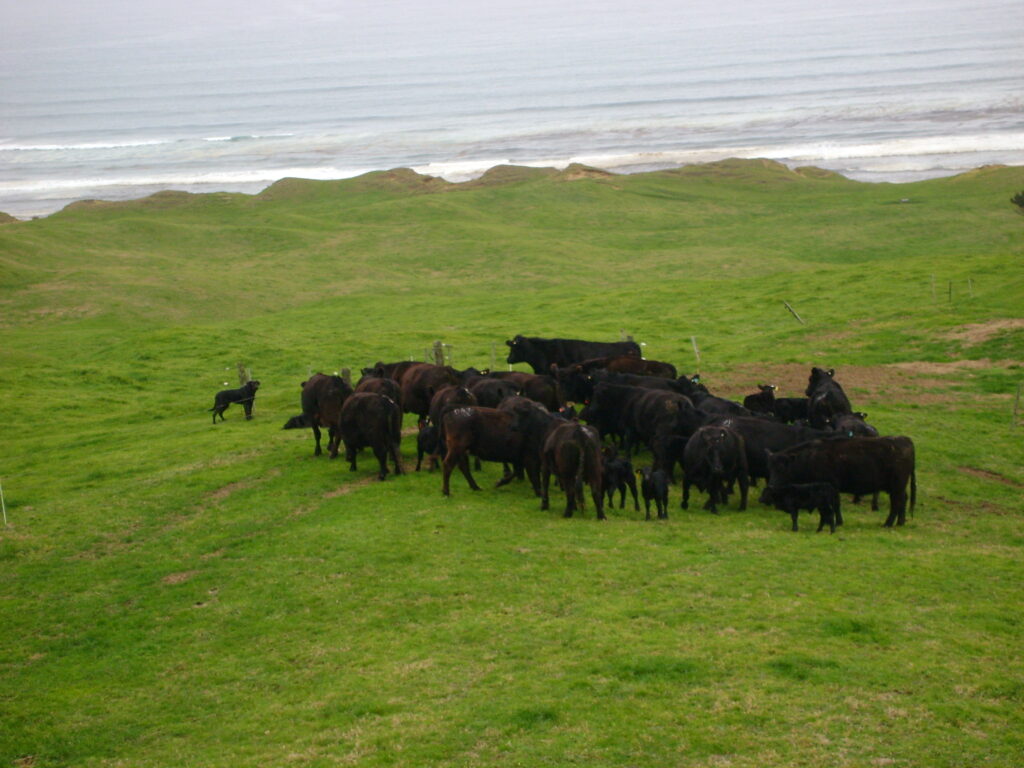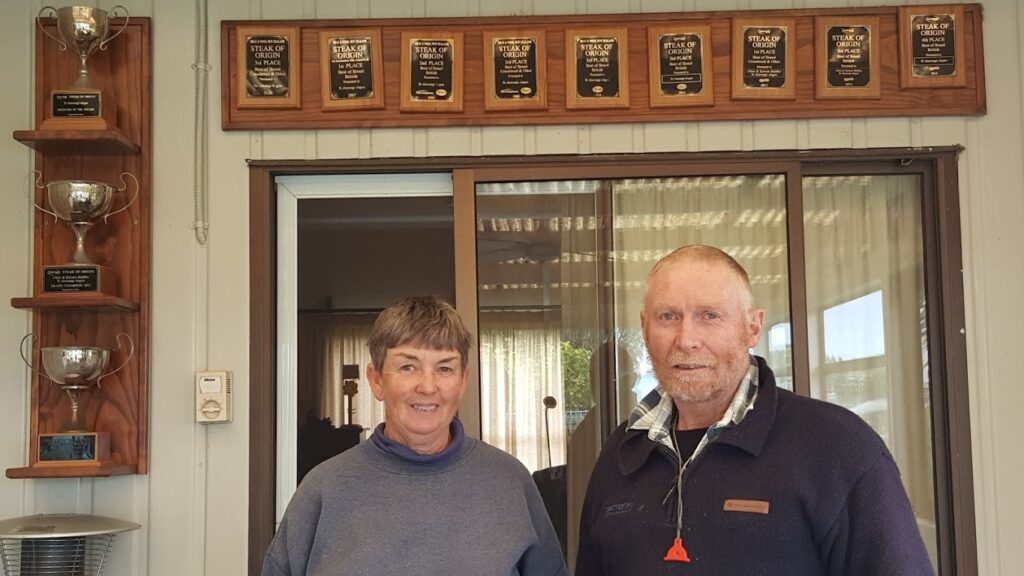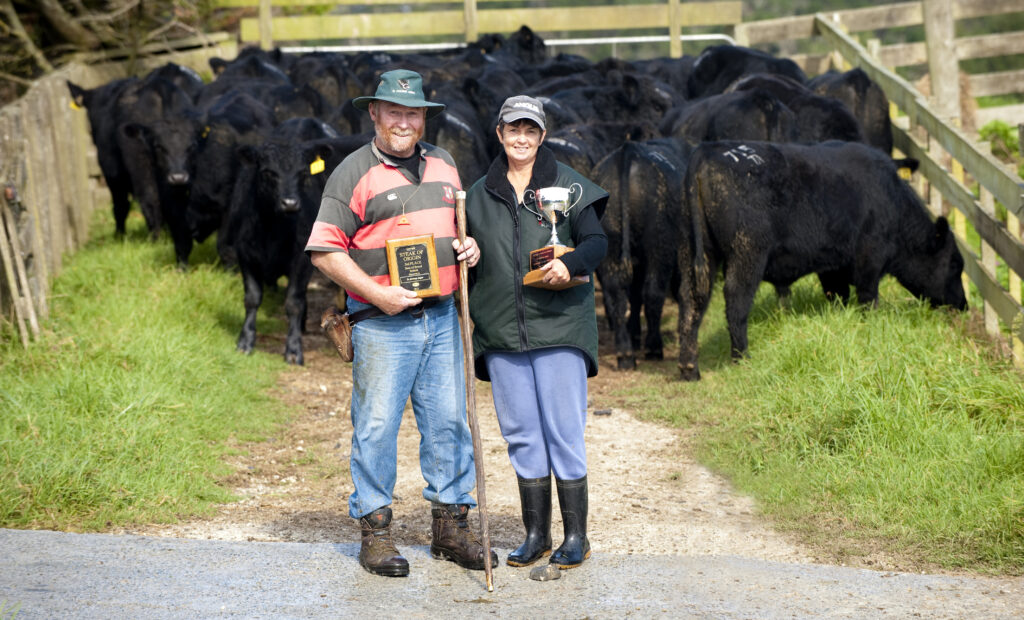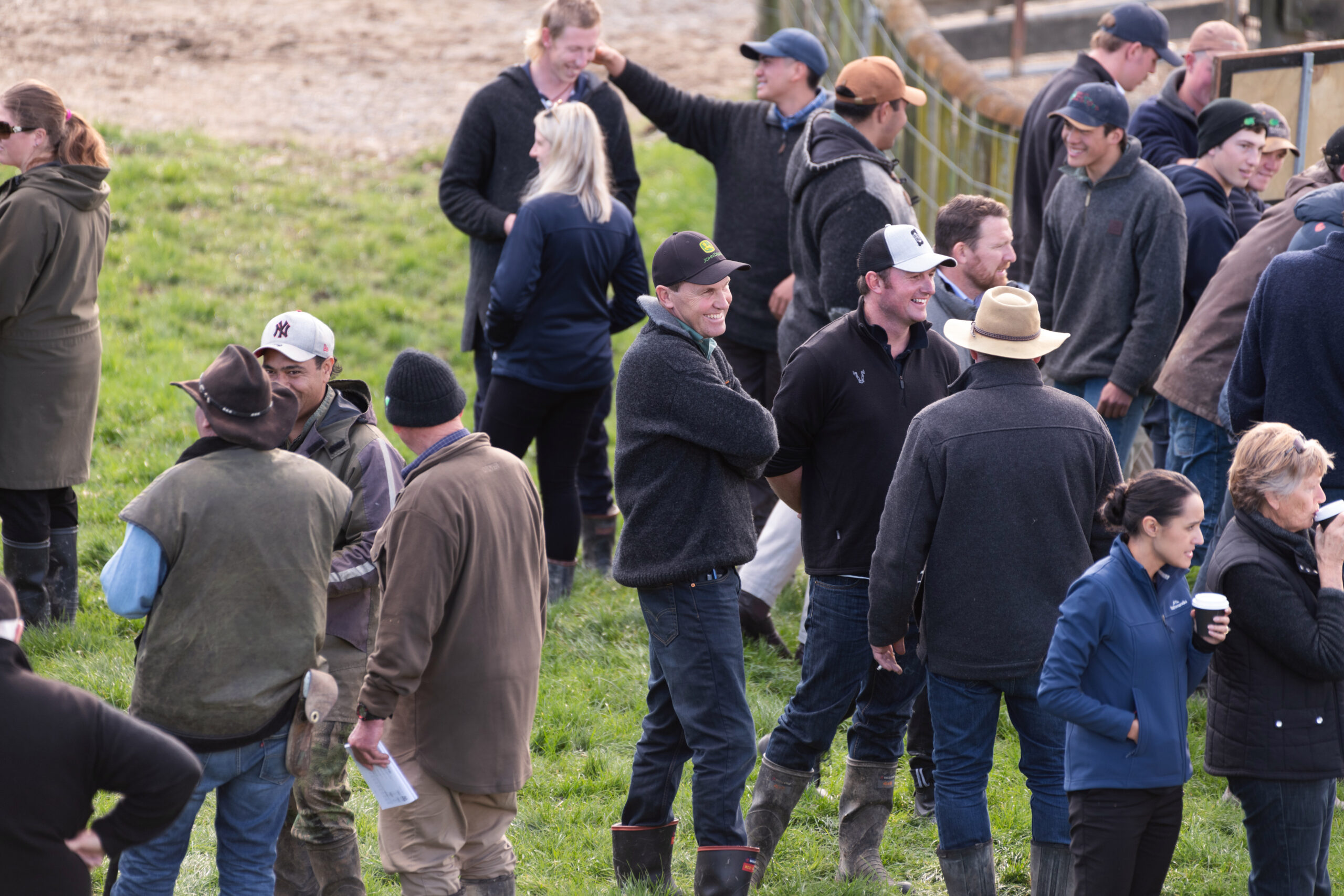
TE ATARANGI
ANGUS
FOR BETTER BALANCED BEEF
Breeder Profile:
Chris & Karren Biddles
Twenty-five years ago, Chris and Karren Biddles of Te Atarangi Angus Stud, identified a gap in the Angus bull market, specializing in calving ease and heifer mating.
It was a market they made their own.
The stud had been established some years prior in 1988, and Chris is proud of the fact they are possibly the only Angus stud in NZ whose complete herd targets ease of calving and heifer mating while selling all bulls as yearlings.
Chris recalls making that decision because the two-year-old bull market was sown up and there was an opportunity.
“Since then there’s been more breeders who do both, but for us we are summer dry and it’s not easy to get the bulls through the second summer.”
The Te Atarangi Stud is situated on the Pouto Peninsula, 25 minutes South West of Dargaville.
The 1000ha summer dry property is farmed in halves; Chris and Karren on one half and their daughter Joanne and son in law Charles lease the other half.
“It’s great having them and a couple of grandkids down the road. We have other family at Mangawhai too.”
Chris and Karren’s enterprise carries nearly all stud Angus cows with a small cross bred beef herd, kept to help with mothering on if needed. There’s also a flock of 28 ewes, which Chris quips is so they don’t have to live on beef alone!
This year they calved 270 cows but will reduce that to 260 next season, which is where they’d ideally like numbers to be.
The cross bred herd consists of 15-month-old heifers bought from a dairy client – they are first cross Jersey Angus which results in three-quarter Angus progeny.
Half the property is Pinaki sand and there’s 2km of Tasman Sea as a boundary.
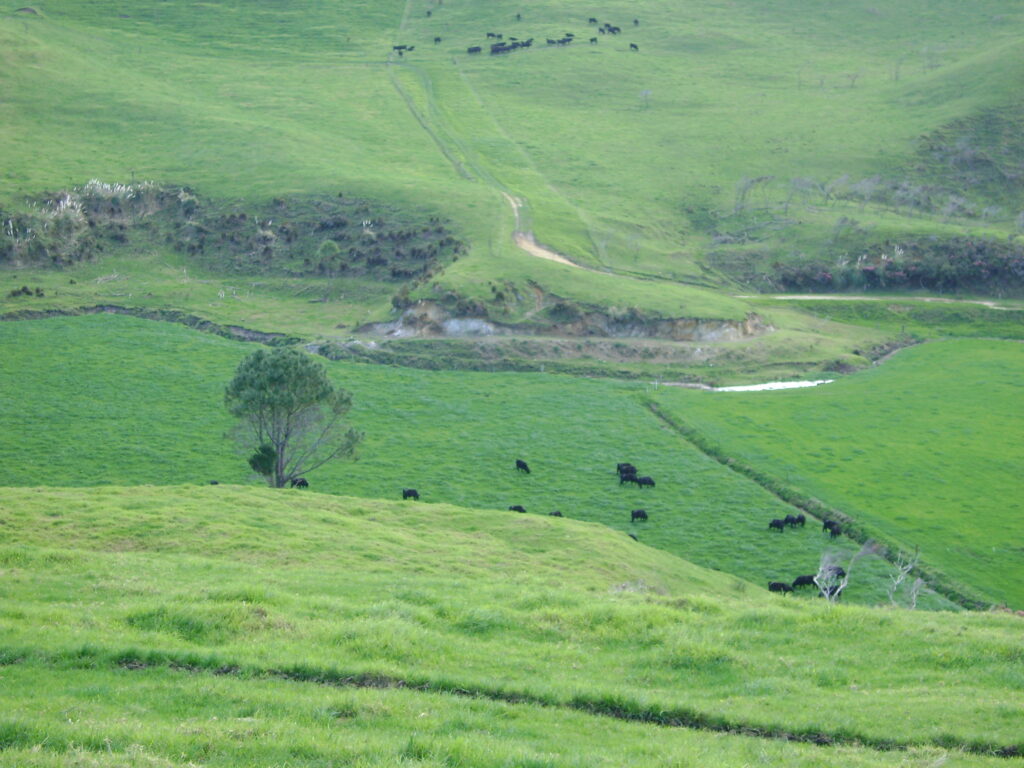
Chris says the sand country is rolling to steep in topography and while the home block has some steeper hills it also has some peat which he describes as very fertile.
“We broke the peat in, it cost a lot of money and took a long time but it’s outstanding land,” says Chris.
“We’re now considering irrigation for the peat country on the back of this year’s drought.”
When Chris’ parents owned the property, it had a small number of paddocks and between the two generations there’s been significant development.
“We’ve gone from 12 paddocks to 300.”
Property Development and History:
He recalls his parents purchasing 607ha at Tangaehe in 1966 which was in six paddocks, one being 283ha and one being 202ha.
“In 1982 my brother Kim and I bought from them, by then there were 24 paddocks and a further 101ha mostly scrub that our house was built on. We split the farm between us. Karren and I had 12 paddocks, a hay barn and store shed and a nice house. There was no yards and no woolshed though, we shared Kim’s. There was also no water system to 95% of the farm.”
Progress continued and in 1990 they bought a neighbouring farm at auction (530ha), which was farmed as Pinaki Station for 10 years in partnership with Kim and brother in law, Peter Pickering.
Then in the year 2000, the Pinaki farm was sold and the Biddles purchased 227ha of it. That purchase improved the shape of the farm and added infrastructure and finishing land. Buildings included a large hay barn, a house, cottage and woolshed.
“In 2006 we leased 240ha of what was part of the original Pinaki farm from the person who bought that block from Kim and in 2010 we bought 165ha of that.”
Water is reticulated from a water ram at the rear of the property, that pumps 4km to four tanks at different locations. That’s then reticulated to most of the farm and means 80% of the property has trough water and approximately a quarter has spring water as backup.
The full name of the property is Te Atarangi O Nga Pa and as the name suggests the property is dotted with Maori pa. The Biddles enjoy the character these add to the property and they take pride in protecting the pa.
Te Atarangi Stud:
With a bull breeding programme that’s as specific as the Biddles it can be challenging to source bulls that offer the right package.
Not only are they trying to tick the low birthweight and heifer mating box, but clients also expect good growth and carcase traits.
Chris acknowledges he should use more home bred sires but they all get sold as yearlings and all going well, 65% of the farm’s income is made on sale day.
To overcome the challenges of sourcing herd sires with the best package they’ve recently established a relationship with Rennylee in Albury, New South Wales as well as a partnership closer to home with Forbes and Angus Cameron of Ngaputahi Angus Stud at Ashhurst near Palmerston North, a partnership that began in 2008.
“We’ve had five bulls in partnership with Forbes, they are well travelled bulls – they travel 1000km each year and we both get full matings,” says Chris.
The Biddles on-farm sale is held in September and they typically offer about 100 yearling sires.
About 60% of their clients are beef farmers with the remaining 40% dairy farmers, but Chris says the dairy clients buy 60% of the bulls.
“Our clients aren’t specifically money orientated; they want a good experience from their bulls. They don’t want to get up in the middle of the night to check their cows and they want to sell four-day -old calves and six-month-old weaners for good money.”
“Our clients are also very good with figures and they understand them and use them as a tool.”
And while the Biddles have very specific goals for their sires, the couple also place a lot of emphasis on fertility as a driver of profitability for their commercial clients.
“The cows are joined with the bull for only 43 days and the 15-month-old Angus heifers have 30 days with the bull.” Anything that doesn’t rear a calf is culled.
Chris also says they’re not chasing a high 600-day weight but are trying to lift the 400-day weight.
“For our herd, we personally believe that the mature cow weight Australasian average is far too high. We do not want big cows. We are after a mature cow weight below the 600-day weight and around the 400-day figure.”
“That’s our personal belief. Chasing mature cow weights could see Angus considered a terminal breed rather than a maternal breed. I stand by that belief and I include it in our sale catalogue that we offer bulls with good growth but are below breed average for 600-day weights.”
Technology and Seedstock Production:
When it comes to EBVs Chris has a philosophy that’s very simple.
“Crap in, crap out.”
“It’s so important to get all the information and accurate information”
“I’m a believer in, if you’re going to do something, you do it properly. And that makes us one of the few Angus breeders in NZ who have five stars for completeness of recording.”
Chris goes on to say they’ve invested heavily in 50k DNA testing at a cost of $22,000 annually which has helped them reach that completeness of recording status.
He’s also seen first-hand how DNA can enhance EBVs.
“We had an animal that was going to be put in the sale – but he was borderline with EBVs. And when the DNA came back his figures moved in a negative way. It could have bitten us in the arse.”
“DNA testing improves accuracy and helps us provide the best service and animals for our clients,” says Chris.
Bull Marketing & Steak Of Origin:
Chris confesses marketing doesn’t come naturally to him and prefers to let his cattle do the talking.
“The cattle themselves are your best advert. As long as the cattle don’t let you down, that’s as good as you get.”
He says they are honoured to have a lot of loyal repeat clients and says he would enjoy taking the time to travel and visit more of them, however off farm commitments don’t always allow for this.
Their marketing has had an organic reach in past years thanks to success in the Beef and Lamb Steak of Origin competition.
Te Atarangi Angus was a name that became synonymous with the Steak Of Origin.
The couple have a collection of 12 finalist plaques from the event.
In 2006 they won the competition outright with an Angus sirloin. In 2012 they were awarded producer of the decade and in 2013 they won the cross bred class with a Jersey Angus cross sirloin and in 2018 they won the Best of British class.
Community:
Community is something that means a lot to Chris and he’s made massive contributions to his communities – both locally and nationally – in the past few decades.
He’s a previous board member of PBB where he served seven years and he spent 10 years on the Angus New Zealand board. As well as 18 years sitting on the Sport Northland Board, 12 of those as deputy chair then chairman. During that time, he chaired a committee that commissioned and reopened a $11 million redevelopment of the Whangarei Aquatic Centre.
He’s also been chairman of Sportsville, a Board charged with delivering a $3 million sports complex in Dargaville which was opened in 2018 and now has 1000 users.
He’s now sitting in a paid governance role on the North Power Trust.
“I enjoy good governance,” says Chris.
“I’ve spent the past 30 years helping to make Northland a better place.”
Accident:
He retired from his position on the Sport Northland board six weeks before his life was turned upside down by an on-farm ATV accident.
In February last year, Chris drove up a hill with the intention to taking the known and only safe route down. But due to deep-set fatigue he mistakenly went over a ridge that wasn’t safe.
He was thrown from his quad bike and made the mad scramble to escape its path as it tumbled down behind him. It caught up with him, crushing his ankle and pinning him by his leg.
Remarkably, he managed to pull his leg free, get to the top of the hill and radio for help.
He says recovery from his accident was always going to be slow, but it’s been a bit slower than he expected.
More than a year on, he’s about to embark on surgery number seven to fuse his ankle. As a result of his accident, he’s unable to work full days on farm but says he and Karren are lucky to have a good team on farm supporting them.
Working alongside Chris and Karren is Daphne Aikin who’s been with them for 14 years and is stockman general. Her husband Dave Aikin does some contract work having previously worked for them for 13 years and Karren and Chris’s nephew Bevan Rakich re-joined the team in 2019 for the third time – between Daphne and Bevan they’ve been with the Te Atarangi for 28 years.
Chris is frank when he says it was important to his recovery to remain mentally strong.
“Kim Lowe (AngusPure territory manager) did me a big favour, she rang me in hospital to check in and at the end of the conversation she said I needed to understand, I’d have good days and bad days and that’d I get through. I told her I disagreed. I couldn’t afford to have bad days.”
“Once I said it I had to live by it, and because I’d said it out loud to her, I had to pull myself together when I was having a bad day. I also knew I was so lucky to be alive.”
Chris escaped with a compound fracture and total dislocation of the ankle and a broken shoulder.
His words for wisdom for farmers everywhere are to regularly evaluate where you are mentally and physically and check in on your staff too.
“In the drought we checked in and asked if each of us was ok.”
“The day of the accident, I knew I was tired, but I didn’t think of the consequences.”
About a decade earlier he’d heard a presentation from ACC on an Angus ward tour in Southland and he took home a message that had always stuck with him.
“That message is to ask yourself, if you’re making a decision on your quad at 2pm, is that the same decision you’d make at 8am? “
“Three weeks before my accident I was mowing hay on a hill. I stopped at the bottom and asked myself would I mow you at 8am in the morning? But three weeks later I wasn’t thinking straight.”
When they’re not farming Chris and Karren like to fish together, but he says they don’t do it enough.
“There’s good fishing at the back of the farm. I also fish at Rotoiti, we have an old family place there that my grandfather built in 1922 and we fish out of a 98-year-old Clinker dinghy that we restored. That’s a special place and I try to go there two or three times a year. I also enjoy the local pub,” he says laughing.
For more information visit www.teatarangi.co.nz
